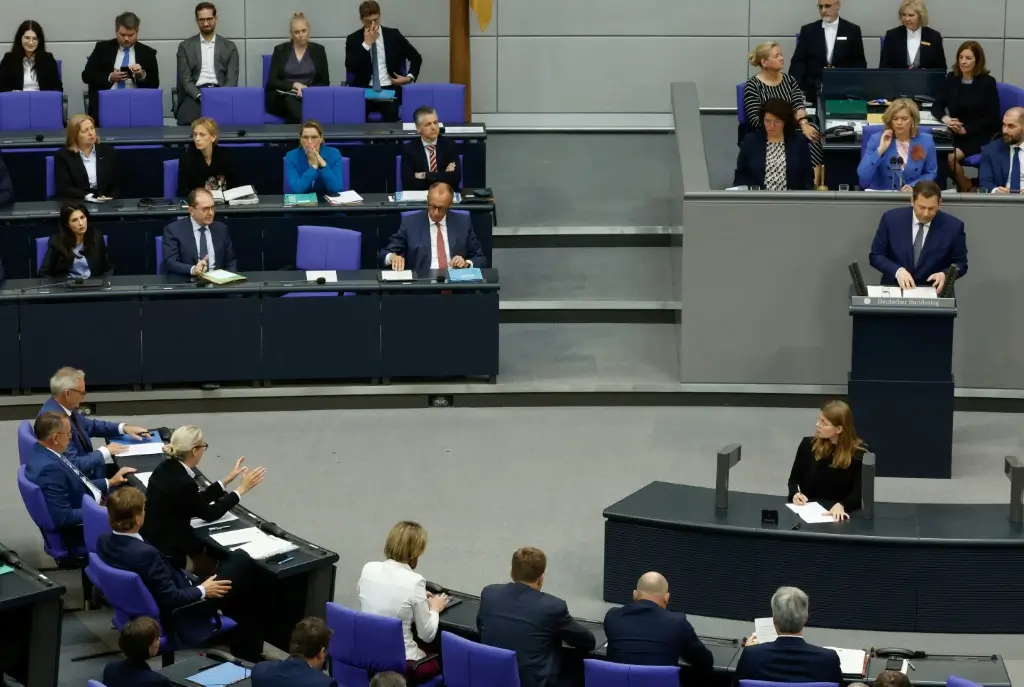
At the start of budget discussions in the Bundestag, Finance Minister Lars Klingbeil (SPD) defended the federal government's financial plans as an investment in Germany's future. "We are investing more heavily than ever before in our country's future viability, and that sends a positive signal," he said in the plenary session on Tuesday. He added that what has been neglected for years is now being addressed. This will create "growth and justice in our country."
Klingbeil presented his budget for 2025 in the Bundestag. The federal government's planned investments for this year alone amount to more than 115 billion euros. These are "record investments," Klingbeil said. "The Ministry of Finance will become an investment ministry." Specifically, decisive investments will be made in roads, education and care, new housing, modern hospitals, digitalization, climate protection, and security.
"In doing so, we are also resolving a conflict that has existed in our society for years," said the Finance Minister, namely the decision whether to invest in the Bundeswehr or industry, whether to help Ukraine or invest in climate protection. "I say very clearly here: Everything is necessary." It is "right that we invest in infrastructure and security, and thus in the future viability of our country," Klingbeil added.
However, the opposition strongly criticized the CDU-SPD coalition’s fiscal approach. The opposition accused the CDU-SPD coalition of record debt and misplaced priorities. The AfD, the Greens, and the Left also criticized on Tuesday that the electricity tax reduction would not apply to everyone as announced.
AfD finance politician Michael Espendiller called the draft budget and financial planning a "fiscal policy rampage" on Tuesday. Instead of consolidating public finances, the CDU-SPD coalition is taking on more than €846 billion in new debt by 2029. As a result, Germany's debt level will increase "by a whopping 50 percent" within one legislative period.
"This mountain of debt is not inevitable," said Espendiller. The goal must be genuine budget consolidation, in which all expenditures are scrutinized. And despite the record debt, the government has once again "broken its word" in postponing the reduction of the electricity tax for everyone, said Espendiller. This is "an absolute disgrace to the working middle class in this country." Instead, the government wants to "buy weapons worth €42.3 billion for Ukraine."
"Your draft budget lacks courage, lacks clear direction, and lacks future," said Green Party finance politician Sebastian Schäfer. Instead of using the record debt as an opportunity for groundbreaking investments in climate protection and the modernization of the country, existing spending programs are now being shifted into special funds to make room in the budget for "election gifts."
In doing so, the government would "prefer to relieve the burden on the better and highest earners," said Schäfer. This is demonstrated by the electricity tax, which, contrary to what was announced in the coalition agreement, will not be reduced for private households for the time being. This represents another "breach of the government's word."
Left Party MP Dietmar Bartsch described the increase in the defense budget to €152.8 billion annually by the end of the legislative period as "madness" at the expense of future generations. "The children and grandchildren will still be paying off the tanks and missiles long after they've become scrap metal."
At the same time, Bartsch also accused the government of "simply lying" in their coalition agreement when they announced a reduction in electricity taxes for everyone as an immediate measure. The fact that this isn't happening for private consumers for the time being is particularly damaging to "low and middle incomes."